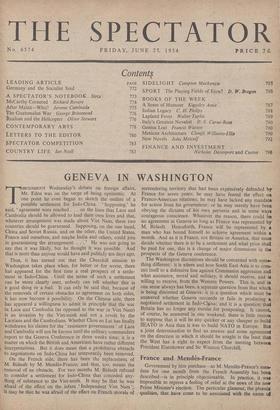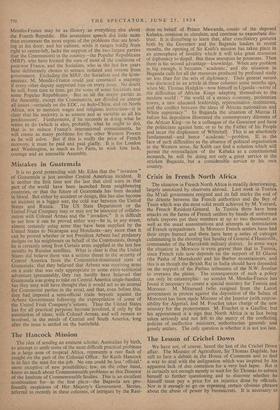France and Mendes-France
Government by hire purchase—as M. MendBs-France's man. date for one month from the French Assembly has been described—is in principle objectionable. In practice, it was impossible to repress a feeling of relief at the news of the new Prime Minister's election. The particular glamour, the phoenix qualities, that have come to be associated with the name o Mendes-France may be as illusory as everything else about the Fourth Republic. His investiture speech did little more than enumerate the most urgent of the problems that are howl- ing at his door; and his cabinet, while it ranges boldly from right to centre-left, lacks the support of the two largest parties (bar the Communists) in the country—the Popular Republicans (MRP), who have formed the core of most of the coalitions of post-war France, and the Socialists, who in the last few years have deliberately chosen to remain isolated and remote from government. Excluding the MRP, the Socialists and the Com- munists, M. Mendes-France could just command a majority if every other deputy supported him on every issue. No doubt he will, from time to time, get the votes of some Socialists and some Popular Republicans. But as all the major parties in the Assembly, except the Communists, are divided on almost all issues—certainly on the EDC, on Indo-China, and on North Africa, not to mention wages and religious instruction—it is clear that his majority is as unsure and as variable as all his predecessors'. Furthermore, if he succeeds in doing what he. wants to do (which is also, probably, what he ought to do), that is to reduce France's international commitments, he will create as many problems for the other Western Powers as he will solve. But if this is really the price of French recovery, it must be paid and paid gladly. It is for London and Washington, as much as for Paris, to wish him luck, courage and an amenable Assembly.



































 Previous page
Previous page